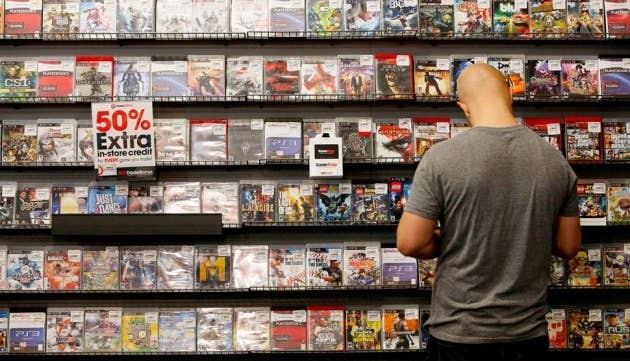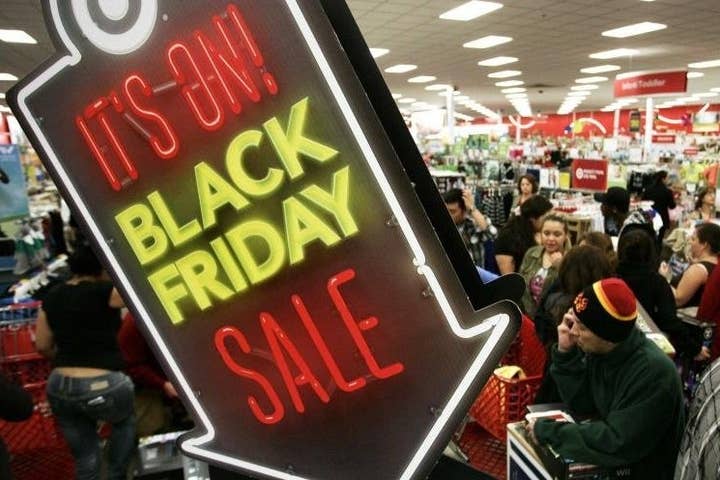Calling time on pre-Thanksgiving release madness
Forcing great games to fight over the same group of consumers only damages profits and increases risk
GameStop isn't happy with the performance of many of this year's supposed blockbuster titles. Ubisoft's Assassin's Creed: Syndicate, EA's Star Wars: Battlefront and Microsoft's Halo 5: Guardians have all, it seems, undershot the retailer's expectations - thus hurting the company's financials despite the more impressive performances of Call of Duty: Black Ops 2 and Fallout 4. The offending titles were named in the investor call following GameStop's somewhat disappointing Q3 financial results, which were largely blamed on lower than expected sales of software and hardware.
Although it will be interesting to see the broader picture of the quarter offered by NPD and other measures - in other words, to get a clear assessment of whether game software and hardware sales are actually lower than expected, or whether it's merely GameStop's share of the market that's taken a hit - the reality is that we all know what the long-term trend here is. GameStop, and all bricks and mortar retailers, are still bleeding out slowly. That's been the case for so long that it's become part of the industry's background noise; we barely even notice that the retail sector is hurting except on the occasions when a retailer announces a new initiative to try to stay relevant, and much of the rest of the industry raises its eyebrows and says "wow, you guys are still around?"
"They're all selling to essentially the same people, and when you put them head to head like this, that makes this into a zero-sum game"
I don't want to pick on GameStop, or any other retailer. At their best, game retailers serve an important and extremely useful function; they're a shop window for the industry as a whole, a way for less informed consumers to browse and get useful advice and information, a major employer and even, in admittedly rare cases, a gateway into the industry for future creatives. At their worst, of course, game retailers are few if any of those things, but I'd rather see those retailers find a way to be their best and make themselves relevant, rather than being their worst and continuing their slow death throes. Still, it's hard to look at a story about GameStop's disappointment in software sales without pondering how very long it's been since I bought a game in a box in a shop, and wondering how many others find themselves thinking the same thing.
Rather than beating the dead horse of retail's prospects, I'd like to draw attention to something in the retailer's statement that strikes me as slightly crazy - not on the part of GameStop, but on the part of the industry as a whole. It's that extraordinary list of games which the company rattled off - five absolutely enormous AAA titles, all of them with significant price tags (into the realms of hundreds of dollars if you want the Season Pass content) and all of them launched within a window of somewhat less than four weeks.
Assassin's Creed Syndicate, October 23rd. Four days later, Halo 5 Guardians. Then Call of Duty Black Ops 2 on November 6th; Fallout 4 on November 10th; Star Wars Battlefront on the 17th. You can add to the list Rise of the Tomb Raider (November 10th) for a total of six huge AAA games with tens of millions of dollars riding on them being launched within a short space of time. To call this lunacy would be too kind; scheduling launches in this way is an extraordinary strategy of deliberately and knowingly increasing the risk profile of AAA publishing at a time when that risk is already spiralling out of control.
"scheduling launches in this way is an extraordinary strategy of deliberately and knowingly increasing the risk profile of AAA publishing"
Of course, these games don't have exactly the same audiences - but the intersection of the Venn diagram between people likely to have an interest in what are all, fundamentally, action-focused AAA console games (three of them science fiction themed first-person shooters!) is pretty enormous. These aren't games which co-exist neatly in the market, happily selling to their own target audience without bothering anyone else's. They're all selling to essentially the same people, and when you put them head to head like this, that makes this into a zero-sum game. Consumers don't have unlimited cash, or unlimited time. The vast, vast majority of consumers will buy one of these six games, or perhaps two, and will leave the other four or five games on the shelf for a later date - most likely, a later date when they're already heavily discounted. By scheduling half a year's worth of AAA releases into the space of less than four weeks, publishers have essentially guaranteed an expensive, damaging battle for attention; Call of Duty can't succeed without Halo 5 faltering; Star Wars Battlefront needs Call of Duty to trip over and fall on its face; Tomb Raider is fighting over the same scraps as Assassin's Creed.

Well, you may say, that's the holiday season for you. The rush was to get these games out the door in time for Thanksgiving in the United States; the assumption is that this is the period of the year in which people spend the most on videogames, and the AAA mega-hits need to be there in force if they're to capitalise upon that. There's some logic behind that idea, not least because a lot of new game consoles get sold on Black Friday and Cyber Monday, the major shopping days following Thanksgiving, and having your game at the front of people's minds when they're buying a new console makes it more likely that they'll add it to the shopping cart. On the other hand, this is exactly the kind of logic that becomes a self-fulfilling prophecy. Do publishers cram AAA releases into a narrow, hyper-competitive window because that's when consumers want to buy games? Or do consumers buy games in that period because that's when publishers release all their biggest titles?
"The reality is that tons of games do incredibly well in other launch windows around the year"
As the sale of games drifts further away from the old bricks'n'mortar model, with more and more revenue coming from digital sales (which essentially means giving games as gifts, at least to adults with their own disposable income, is declining sharply - and one can only hope that the four out of six major AAA releases of the past month which are ESRB M-rated aren't being given as gifts to anyone other than adults) and most physical sales being done online, the basic logic of putting these games head to head needs to be severely questioned. The reality is that tons of games do incredibly well in other launch windows around the year. Nobody looked at The Witcher 3 or Batman: Arkham Knight earlier in the year and thought, "ah, if only they'd been launched in early November, they'd have done so much better"; the market for games exists all the year around, not just for a few weeks in November, and sales figures for games released well outside the "Thanksgiving window" strongly suggest that the aggressive competition of Thanksgiving cancels out the potential sales boost offered by the period.
The problem, I suspect, lies with asking publishers to swallow their pride and move their games away from this coveted and irrationally "important" release period. To many executives, the notion of moving their top product away from Thanksgiving would be tantamount to saying that they don't have faith in it as it stacks up against the competition; the loss of face, of confidence, would be intolerable, even if a more sensible date delivered better sales at a lower risk profile. The whole exercise of pre-Thanksgiving releases has turned into a macho stare-down; as execs stubbornly refuse to blink first, great games end up haemorrhaging sales in an unnecessarily competitive environment, and "winners and losers" are forced into being from slates of games which should, by rights, all be winners. As budgets soar for both development and marketing, publishers should be finding ways to reduce risk, not to take on more for no reason; just as movie companies are careful to keep their blockbuster release dates well apart in theatres, game companies need to learn to quit the posturing and find an approach to scheduling that works to maximise benefit for everyone.

